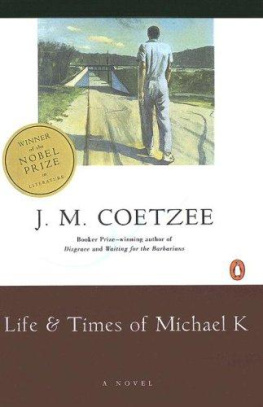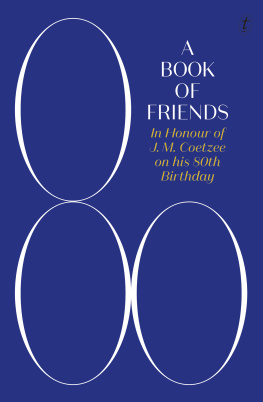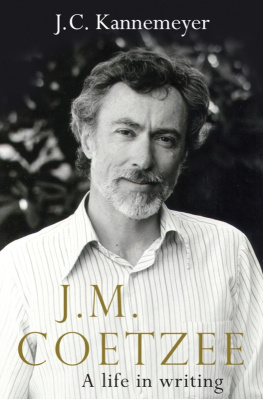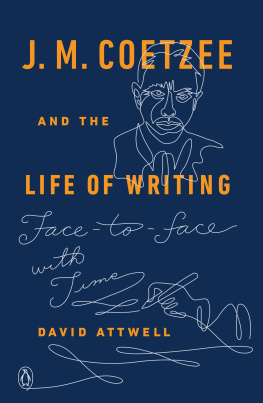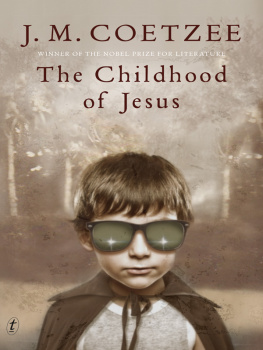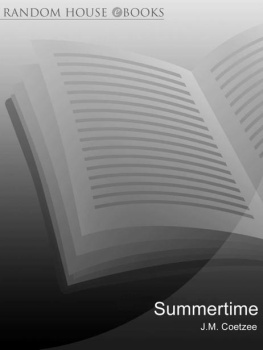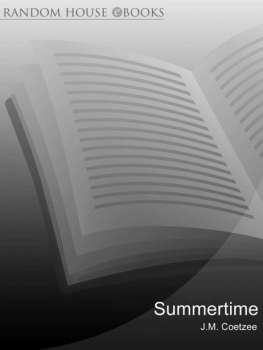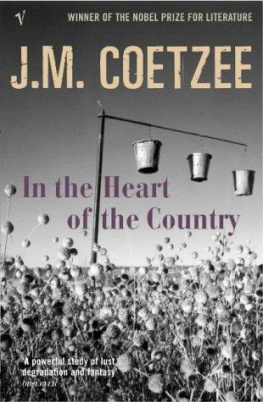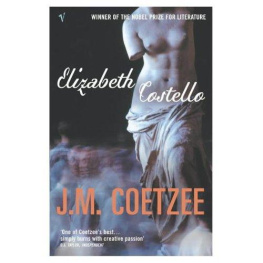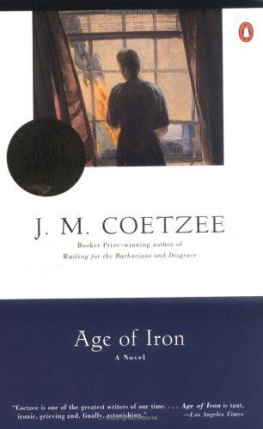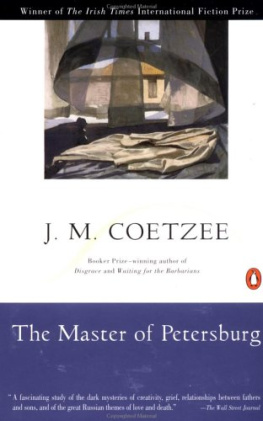J.M.Coetzee - Life and Times of Michael K
Here you can read online J.M.Coetzee - Life and Times of Michael K full text of the book (entire story) in english for free. Download pdf and epub, get meaning, cover and reviews about this ebook. genre: Detective and thriller. Description of the work, (preface) as well as reviews are available. Best literature library LitArk.com created for fans of good reading and offers a wide selection of genres:
Romance novel
Science fiction
Adventure
Detective
Science
History
Home and family
Prose
Art
Politics
Computer
Non-fiction
Religion
Business
Children
Humor
Choose a favorite category and find really read worthwhile books. Enjoy immersion in the world of imagination, feel the emotions of the characters or learn something new for yourself, make an fascinating discovery.
- Book:Life and Times of Michael K
- Author:
- Genre:
- Rating:3 / 5
- Favourites:Add to favourites
- Your mark:
- 60
- 1
- 2
- 3
- 4
- 5
Life and Times of Michael K: summary, description and annotation
We offer to read an annotation, description, summary or preface (depends on what the author of the book "Life and Times of Michael K" wrote himself). If you haven't found the necessary information about the book — write in the comments, we will try to find it.
Life and Times of Michael K — read online for free the complete book (whole text) full work
Below is the text of the book, divided by pages. System saving the place of the last page read, allows you to conveniently read the book "Life and Times of Michael K" online for free, without having to search again every time where you left off. Put a bookmark, and you can go to the page where you finished reading at any time.
Font size:
Interval:
Bookmark:
J. M. Coetzee
Life Times Of Michael K
War is the father of all and king of all. Some he shows as gods, others as men. Some he makes slaves, and others free.
ONE
THE FIRST THING THE MIDWIFE NOTICED ABOUT MICHAEL K when she helped him out of his mother into the world was that he had a hare lip. The lip curled like a snail's foot, the left nostril gaped. Obscuring the child for a moment from its mother, she prodded open the tiny bud of a mouth and was thankful to find the palate whole.
To the mother she said: 'You should be happy, they bring luck to the household.' But from the first Anna K did not like the mouth that would not close and the living pink flesh it bared to her. She shivered to think of what had been growing in her all these months. The child could not suck from the breast and cried with hunger. She tried a bottle; when it could not suck from the bottle she fed it with a teaspoon, fretting with impatience when it coughed and spluttered and cried.
'It will close up as he grows older,' the midwife promised. However, the lip did not close, or did not close enough, nor did the nose come straight.
She took the child with her to work and continued to take it when it was no longer a baby. Because their smiles and whispers hurt her, she kept it away from other children. Year after year Michael K sat on a blanket watching his mother polish other people's floors, learning to be quiet.
Because of his disfigurement and because his mind was not quick, Michael was taken out of school after a short trial and committed to the protection of Huis Norenius in Faure, where at the expense of the state he spent the rest of his childhood in the company of other variously afflicted and unfortunate children learning the elements of reading, writing, counting, sweeping, scrubbing, bedmaking, dishwashing, basketweaving, woodwork and digging. At the age of fifteen he passed out of Huis Norenius and joined the Parks and Gardens division of the municipal services of the City of Cape Town as Gardener, grade 3(b). Three years later he left Parks and Gardens and, after a spell of unemployment which he spent lying on his bed looking at his hands, took a job as night attendant at the public lavatories on Green-market Square. On his way home from work late one Friday he was set upon in a subway by two men who beat him, took his watch, his money and his shoes, and left him lying stunned with a slash across his arm, a dislocated thumb and two broken ribs. After this incident he quit night work and returned to Parks and Gardens, where he rose slowly in the service to become Gardener, grade t.
Because of his face K did not have women friends. He was easiest when he was by himself. Both his jobs had given him a measure of solitariness, though down in the lavatories he had been oppressed by the brilliant neon light that shone off the white tiles and created a space without shadows. The parks he preferred were those with tall pine trees and dim agapanthus walks. Sometimes on Saturdays he failed to hear the boom of the noon gun and went on working by himself all through the afternoon. On Sunday mornings he slept late; on Sunday afternoons he visited his mother.
Late one morning in June, in the thirty-first year of his life, a message was brought to Michael K as he raked leaves in De Waal Park. The message, at third hand, was from his mother: she had been discharged from hospital and wanted him to come and fetch her. K put away his tools and made his way by bus to Somerset Hospital, where he found his mother seated on a bench in a patch of sunlight outside the entrance. She was fully dressed, save that her street shoes stood beside her. When she saw her son she began to weep, holding a hand before her eyes so that other patients and visitors should not see.
For months Anna K had been suffering from gross swelling of the legs and arms; later her belly had begun to swell too. She had been admitted to hospital unable to walk and barely able to breathe. She had spent five days lying in a corridor among scores of victims of stabbings and beatings and gunshot wounds who kept her awake with their noise, neglected by nurses who had no time to spend cheering up an old woman when there were young men dying spectacular deaths all about. Revived with oxygen when she arrived, she was treated with injections and pills to bring down the swelling. When she wanted a bedpan, however, there was seldom anyone to bring it. She had no dressing-gown. Once, feeling her way along the wall to the lavatory, she had been stopped by an old man in grey pyjamas who spoke filth and exposed himself. The needs of her body became a source of torment. When the nurses asked about the pills she said she had taken them, but often she was lying. Then, though the breathlessness abated, her legs grew so itchy that she had to lie on her hands to control the urge to scratch. By the third day she was pleading to be sent home, though evidently not pleading with the right person. The tears she wept on the sixth day were thus largely tears of relief that she was escaping this purgatory.
At the desk Michael K asked for the use of a wheelchair and was refused it. Carrying her handbag and shoes for her, he supported his mother the fifty paces to the bus stop. There was a long queue. The timetable pasted on the pole promised a bus every fifteen minutes. They waited for an hour while the shadows lengthened and the wind grew chilly. Unable to stand, Anna K sat against a wall with her legs before her like a beggarwoman while Michael kept their place in the line. When the bus came there were no seats. Michael held on to a rail and embraced his mother to keep her from lurching. It was five o'clock before they arrived at her room in Sea Point.
For eight years Anna K had been employed as a domestic servant by a retired hosiery manufacturer and his wife living in a five-roomed flat in Sea Point overlooking the Atlantic Ocean. In terms of her contract she came in at nine in the morning and stayed till eight at night, with a three-hour break in the afternoon. She worked alternately five and six days a week. She had a fortnight's paid holiday and a room of her own in the block. The wage was fair, her employers were reasonable people, jobs were hard to come by, and Anna K was not discontented. A year ago, however, she had begun to experience dizziness and tightness of the chest when she bent down. Then the dropsy had set in. The Buhrmanns kept her on to do the cooking, cut her pay by a third, and hired a younger woman for the housework. She was allowed to stay on in her room, over which the Buhrmanns had the disposal. The dropsy grew worse. For weeks before entering hospital she had been bedridden, unable to work. She lived in dread of the end of the Buhrmanns' charity.
Her room under the stairs of the Cte d'Azur had been intended for air-conditioning equipment, which had never been installed. On the door was a sign: a skull and crossed bones painted in red, and underneath the legend danger-gevaar-ingozi. There was no electric light and no ventilation; the air was always musty. Michael opened the door for his mother, lit a candle, and stepped outside while she prepared for bed. He spent this, the first evening of her return, and every evening for the next week, with her: he warmed soup for her on the paraffin stove, saw to her comfort as far as he was able, carried out necessary tasks, and consoled her by stroking her arms when she fell into one of her fits of tears. One evening the buses from Sea Point did not run at all and he had to spend the night in her room sleeping on the mat with his coat on. In the middle of the night he woke chilled to the bone. Unable to sleep, unable to leave because of the curfew, he sat shivering on the chair till daylight while his mother groaned and snored.
Michael K did not like the physical intimacy that the long evenings in the tiny room forced upon the two of them. He found the sight of his mother's swollen legs disturbing and turned his eyes away when he had to help her out of bed. Her thighs and arms were covered with scratch marks (for a while she even wore gloves at night). But he did not shirk any aspect of what he saw as his duty. The problem that had exercised him years ago behind the bicycle shed at Huis Norenius, namely why he had been brought into the world, had received its answer: he had been brought into the world to look after his mother.
Next pageFont size:
Interval:
Bookmark:
Similar books «Life and Times of Michael K»
Look at similar books to Life and Times of Michael K. We have selected literature similar in name and meaning in the hope of providing readers with more options to find new, interesting, not yet read works.
Discussion, reviews of the book Life and Times of Michael K and just readers' own opinions. Leave your comments, write what you think about the work, its meaning or the main characters. Specify what exactly you liked and what you didn't like, and why you think so.

